Product Support
Get help with products
Stuck on how to use one of our products?
Not sure how to clean them?
Find all the useful support information right here.
Getting Started
Thanks for purchasing a Tommee Tippee Silicone Breast Pump! As part of our Made for Me™ range, this simple silicone pump can be used as a gentle low-pressure pump, as a let-down catcher, or to provide relief to engorged or milk-filled breasts.
This page is here to help you get the most out of your breast pump, and to answer any questions you may have. Keep on reading for product support and troubleshooting advice.
Parts Guide
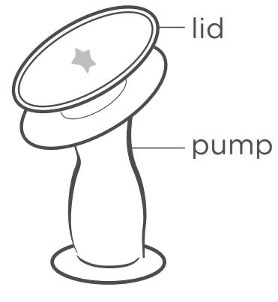
Getting Started
In the box, as well as your pump, you’ll also find a silicone sterilising lid that you can use to keep your pump sterile when you take it out and about. Simply add 30ml of water to the pump and place it in the microwave for four minutes with the lid on.
There’s also a single-use milk storage pouch to get you started which is sterile and ready for use.
Measurements
Your silicone breast pump has two sets of measurements to help you monitor your milk flow and quantity. Metric millilitre (ml) and UK fluid ounces (floz) are on the side facing you (marked metric millimetres) and US fluid ounces (floz) are marked on the side facing away from you (marked US).
Please note…
- Unless you’ve been told otherwise, the best time to try your breast pump for the first time is after your baby’s first feed of the day.
- Make sure you’re in a comfortable position and try to relax.
- Remember, you’re not trying to suck milk out. It comes from just behind your nipple.
- Using your breast pump shouldn’t hurt. If it does, try a gentler pressure. Then check your breasts. If you have any red or hot areas, stop using the breast pump and get in touch with your breastfeeding advisor as soon as possible.
- Every mum is different. You may only produce a little milk, or flow freely. You may produce more milk at different times of the day (morning or evening) or different volumes from one breast to another.
- Don’t continue using the pump once your milk has stopped coming. Give your breasts a break.
How to Use
How to use the self-sterilising lid
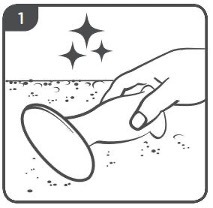
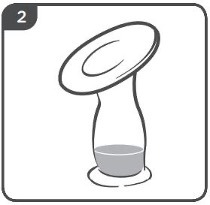
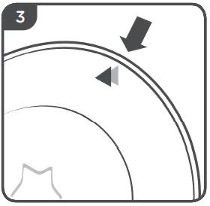
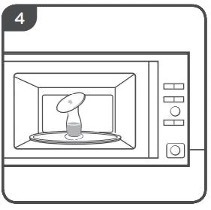
- Wash your pump in soapy water, rinse thoroughly with clean water.
- Fill the pump with 30ml of water.
- Place the lid onto the pump, ensure you have the lid on the correct way by lining up the triangles on the lid and pump.
- Place your pump with the lid attached into the microwave. Microwave for 4 minutes (750-1000 W).
- Always allow to cool for at least 2 minutes before removing from the microwave. The pump will contain hot water and steam. To avoid risk of scalding and burns take extra care when handling.
- The pump will stay sterile for up to 24 hours if you remove the water and keep the lid on.
How to attach your silicone breast pump
- Squeeze the bottom part of the pump gently.
- Gently place the cup onto your breast, with your nipple and areola in the centre.
- Release your hand. Your nipple should sit and seal around the narrow neck of the pump and be gently drawn into the pump as you release your hand. There is no need to seal the whole pump with your breast or push your breast into the pump.
- For best results ensure your nipple is centred in the narrow neck of the breast pump. It might take a few goes to find the right position for you.

How to use your pump as a let-down catcher
When nursing on one breast many mums find that they naturally produce some milk from the other breast. You can use your Made for Me® Silicone Breast Pump to catch any milk you produce from the opposite breast while nursing.
First, attach your silicone breast pump as shown above.
- If you are already producing milk, then leave the pump in place to collect it.
- If you need to stimulate let-down, gently squeeze the pump a few times or massage your breast until your milk starts to flow.
- Nurse your baby on your opposite breast while using the silicone pump to catch your let-down milk.
- When your milk is no longer freely flowing, remove the pump from your breast. Decant your milk into a clean, sterilised bottle or pouch as shown to feed or store.
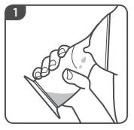
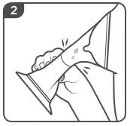
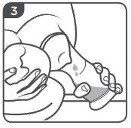
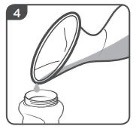
How to use your pump as a manual breast pump
To use this pump as a manual breast pump, it might help to try a few slightly different positions to find where it’s most comfortable to place the pump on your breast.
- Attach your silicone breast pump as shown above.
- Squeeze the pump base and release to gently pump milk from your breast. Once the bottle expands, repeat to pump milk.
- If you need to stimulate milk flow, gently squeeze the pump a few times or massage your breast until your milk starts to flow. You may find it more comfortable to support the pump as it fills with breast milk.
- When your milk is no longer freely flowing, remove the pump from your breast. Decant your milk into a clean, sterilised bottle or pouch as shown to feed or store.
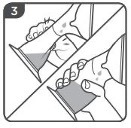
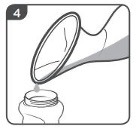
When you want to stop or pause expressing
If you want to take a break or stop pumping, you can place your silicone breast pump on a clean dry surface. To keep it upright, the silicone pump has a suction base that will attach to the surface and prevent any accidental spills.
How to store expressed breastmilk
Breast milk can be stored using the following guidelines. Please note, this table aims to provide a guide to how long you can store breastmilk for a full term baby with no additional health concerns.
|
Method of Storing Breast Milk |
Use Within |
Remember... |
|
Room temperature <25°C |
6 Hours |
|
|
Refrigerated at 5-10°C |
3 Days |
|
|
Refrigerated at 0-4°C |
6 Days |
|
|
Frozen |
6 Months |
- When you want to freeze breast milk, allow space at the top of your bottle for it to expand. It’s easiest to freeze breast milk in individual feed quantities of 60-125ml/2-4oz.
- Your breast milk may separate out into layers when you store it. Give it a shake to remix it thoroughly before feeding your baby.
- Thaw frozen breast milk in the fridge or by standing your bottle in lukewarm water until it has reached body temperature. Or use a Tommee Tippee bottle warmer.
- If you want to take expressed breast milk out and about with you, make sure it stays cold or frozen until you need to feed your baby.
How to use breast milk storage bags
- Express breast milk into your breast pump.
- Wash your hands with soap and rinse before handling bag.
- To open, tear off and dispose of tab, gently pull seals apart.
- Open bag and pour the freshly expressed breast milk into the bag. If you are planning to freeze the breast milk, do not exceed 12floz/350ml to allow space at the top of the bag for expansion.
- Squeeze out as much air as possible before double sealing the bag at the top.
- Make a note of your name (if storing at work), date and volume expressed.
- Place bag in fridge or freezer until required.
- Thaw frozen breast milk by placing the bag in the refrigerator or by standing it in a bowl of lukewarm water until it had reached body temperature.
- You will notice that stored breast milk separates into layers. Shake to remix thoroughly before feeding.
- Dispose of bag after use, as it's non-reusable.
Remember…
- To keep your silicone breast pump sterile on the go, keep the sterilising lid on the pump after sterilising.
- Always store your silicone breast pump in a cool, dry place away from heat and moisture and out of direct sunlight.
- Keep your silicone breast pump well out of reach of your baby and any young children.
- Do not allow product to come into contact with oil-based foods (e.g. oil/tomato-based sauces) as staining will occur.
How to Clean
How to clean your silicone breast pump
You can wash your silicone breast pump in clean soapy water, but don’t use water that you’ve used for cleaning other products. Then rinse thoroughly with clean water.
Sterilise the silicone pump using either the lid provided and putting the pump in a microwave or cold water sterilisation, electric steam sterilisation or UV sterilisation.
The included milk storage pouch is a single use pouch and is sterile ready for use.